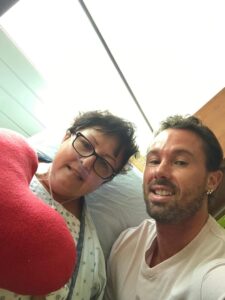November 28, 2022
“Kelley, we need to reboot your heart.”
Kelley Turnbull and her husband, Rick, had been watching TV at home one evening in the fall of 2017, and her heart rate had shot up to 140 beats per minute, twice her normal resting heart rate. She could feel it racing.
Rick rushed her to St. Boniface Hospital’s Emergency Department, where she was seen right away.
Three months before her visit to Emergency, Turnbull had undergone open-heart surgery at St. Boniface to replace her aortic valve. The mechanical valve she now had sounded to her like a Timex wristwatch in her chest, and she could hear it ticking away. She wondered if she was in trouble.
Startled, she asked, “What do you mean by ‘reboot’? Like a laptop computer?”
“We’re going to use a drug to stop your heart,” the physician in the room explained. “Then, the same drug will start it again, and it will return to a normal rate.”

Tests revealed hidden heart defect
Turnbull knew she had a heart murmur growing up, but it never slowed her down. All her life, she did what she wanted to.
That is until she started feeling exhausted and run down in the spring of 2017. She was 57 and going through menopause. She wondered if that could be the reason she couldn’t do things the way she used to.
At her annual physical, her doctor scheduled her for an echocardiogram and an angiogram at St. Boniface Hospital. That’s when they found she had been born with a bicuspid aortic valve, with two flaps instead of three. It wasn’t opening and closing as it should.
Turnbull’s doctor told her she would need to have open-heart surgery, very soon!
“Your mind goes all over the place when you’re facing surgery that serious,” she said. “You have to get your affairs in order; the stuff that you had talked about, you have to take care of. Conversations you don’t want to have, you have.”
Shared experience gave Turnbull comfort
The day of her operation came in July 2017, and she felt as calm as could be. She met her surgical nurse in the elevator – the way she saw it, she had a prime escort! She was sent up with her husband and two adult children. The cardiologist got to meet them all, and he answered their questions.
Her fear left her as her surgery approached. “I almost forgot to say goodbye to my family when it was time for me to go in because I felt so ready,” she explained.
Turnbull then met her anesthesiologist – a younger man who, as it turned out, had the same operation she was about to several years earlier.
“Seeing me now, would you know?” he asked. “I can still play racquetball; I can do all sorts of things,” he said.
She thought, “I never could play racquetball, but if he can do all those things, so will I. It’s not the end – there’s still lots for me to do.” Talking to someone who had gone through it comforted her and encouraged her.
“The compassion at St. Boniface Hospital made a difference for me,” said Turnbull.
“I owe them my life, probably twice.”
Here she was, three months after her successful operation, in the Emergency Department with a racing heartbeat. Her recovery had gone smoothly until that point. The physician’s words echoed in her mind: “Kelley, we need to reboot your heart.”
She knew she didn’t have a choice. A nurse held her hand because she was scared.
“Busy as they were in the Emergency Department, it wasn’t, the hustle-bustle, rush me through. They took the time to let me know I was going to be OK, and I was,” she said.
“I felt secure, and that’s an amazing feeling when you’re going through something traumatic.”
It was time. Her husband was with her. She closed her eyes, and when she opened them again, her heart was beating normally. The reboot had worked!
“You never know what somebody has gone through at work, or what kind of day they are having, but at St. Boniface they are always there for you and your family. The nurses there were so attentive to me and my family, both when I had her operation and after, when I had to go to the Emergency Department,” said Turnbull.
“I owe them my life, probably twice.”
Anyone could have to go through this. Kelley Turnbull didn’t expect it to be her.
“I tell people, ‘I could be your mother, your sister, your aunt. What happened to me could happen to any woman, and not just the elderly, either.’”
Support our Emergency Department redevelopment and expansion. Donate today.


